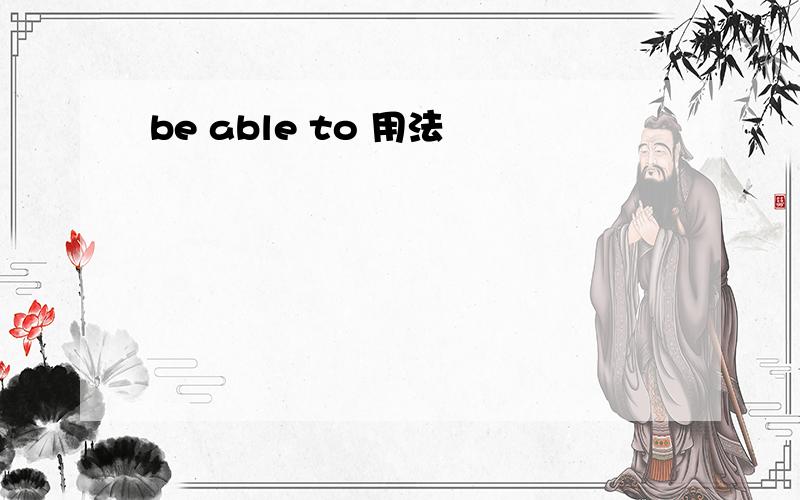be able to 用法
来源:学生作业帮助网 编辑:作业帮 时间:2024/11/17 17:40:56

be able to 用法
be able to 用法
be able to 用法
be able to与can用法区别:
(1) be able to 强调通过努力而获得的能力,而can则强调自身已具有的能力.如:
She can sing the song in English. 她能用英语唱这首歌.
He will be able to sing this song in English in a few minutes, too. 几小时之后,他也能用英语唱这首歌.
(2) be able to 强调一种结果,而can只强调一种可能.如:
Luckily, he was able to escape from the big fire in the end. 幸运的是,他终于逃出了大火.
If he got here a few hours earlier, I could save him. 要是他早几小时来,我还能救他.
(3) be able to 可以有各种时态;而can只有一般现在和一般过去两种时态.如:
I could help you last night, but you didn’t come. 昨天晚上我能帮你,而你又没来.
Can you see it there? 你能看见它在那儿吗?
He is / was / will be able to help you. 他能帮你的忙.
(4) can可用于表示可能性,推测,允许等情况,而be able to通常不这样用.
can的用法和意义:
(1) 表示能力,意思为“能,会”.如:
I can sing this song in English. 我能用英语唱这首歌.
Can you tell me where the museum is? 你能告诉我博物馆在哪吗?
(2) 表示许可,意思是“可以”.如:
You can use my pen instead 你可以用我的笔.
Can I come in? 我可以进来吗?
(3) 表示推测,意为“可能,会”,主要用于否定句和疑问句中.如:
Can he be there too? 他也会在那儿吗?
He can’t have finished his work. 它不可能把工作做完了.
【说明】有时也用于肯定句中表示“有时”,或表示理论上的可能性.如:
She can be very unpleasant. 她有时很令人讨厌.
Even experienced teachers can make mistakes. 即使是有经验的教师也可能出错.
(4) 表示惊讶,通常用于疑问句、否定句和惊叹句中.如:
Can this be your reason? 这难道就是你的理由?
How can you say it like that? 你怎么能那样说话呢?
注意:从理论上说,could是can的过去式,但在某些场合中,could可用来代替can,表示现在的情况,只是语气较can委婉,此时,若用could来提问题,回答时,应该用can,而不用 could.如:
Could you answer me a question? 请回答我一个问题好吗?
Yes, I can. / No, I can’t. 好./ 不行.
希望对你有帮助 如有疑问 请在线交谈 祝你考上理想的学校 O(∩_∩)O